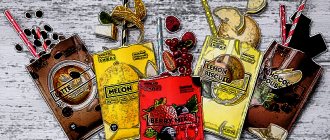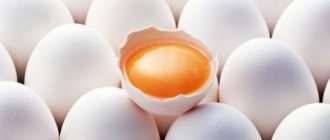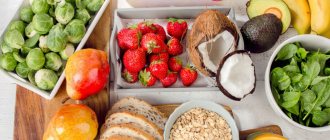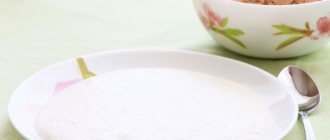The period of breastfeeding is one of the responsible and important moments in the life of a new mother. Breast milk contains a record amount of valuable and essential substances that make it possible to fully provide the baby’s body with all the necessary components for its healthy growth and development. The good health of the baby directly depends on the diet of the nurse. It is worth noting that breast milk is the only source of nutrition in the first days and months of a child’s life, so the young mother has a huge responsibility.
Now let's look at this in more detail.
Proper and nutritious nutrition for a nursing mother is the key to the well-being and health of the baby. During the lactation period, a nursing mother should pay special attention to her diet and understand that all the foods she eats are absorbed into the baby’s body. The more a woman monitors her nutrition and follows a certain diet, the better the baby will feel. The list of permitted foods for a nursing mother in the first months of life is quite limited. It contains only those products that will not disrupt the functioning of the child’s digestive system or cause allergic reactions. The mother’s need for a strict diet is explained by the fact that after birth, the child’s internal organs and systems have not yet matured, so consuming any prohibited product can cause colic, bowel dysfunction, allergies and even poisoning.
The importance of proper nutrition
For the normal process of lactation, a sufficient amount of proteins, fats and carbohydrates must enter the body after childbirth for a nursing mother. Their deficiency causes a change in the quality properties of milk. Severe nutrient deficiency contributes to a decrease in lactation or its complete cessation. What should a nursing mother eat, what diet should she eat during breastfeeding for the first month, and what diet should she eat during breastfeeding?
Balanced diet
The correct growth and development of a baby after birth depends on the amount of vitamins, macro and microelements in his body, which should be included in the menu of a nursing mother in the first month. The child receives these substances only from mother’s milk. Also, most of the water enters the baby’s body during feeding. With normal lactation, the child does not need additional sources of fluid.
A balanced diet for a mother while breastfeeding helps strengthen the baby's immune system. At first, the baby’s body copes with infections with the help of antibodies it received from the mother during pregnancy.
Important diet
However, after a few months, the supply of antibodies is depleted and the child needs a new source. Mother's milk contains all the necessary protective proteins, thanks to which the baby can cope with bacteria before the full functioning of its own immune system begins.
Breast milk contains all the substances obtained from the diet of the nursing mother of the newborn. An improper diet for a nursing mother can contribute to the development of poisoning and allergic reactions in the baby.
With milk, the baby receives some hormones, and nutrition during breastfeeding for 1 month provides the necessary for its growth. Deficiency of iodine, silicon, iron and vitamins causes a deterioration in the functioning of the endocrine glands in the mother's body, if the nursing mother's menu in the first month does not contain these elements.
Lazy dumplings - tasty and low-fat!
Lazy dumplings are prepared from ingredients that will not harm the baby’s health or the mother’s figure. To prepare them you will need half a kilogram of cottage cheese, flour, one egg and a pinch of salt. First of all, you need to prepare the dough - only from flour, salt and eggs. Next, form a sausage and cut it into balls. Place cottage cheese in the center and make a dumpling. After you finish making the dumplings, put them in the refrigerator to cool for half an hour. After this time they can be cooked. When serving, sprinkle the portion with parsley and dill. At the same time, if you want to lose weight, you should not add sour cream to them, even low-fat.
Above are examples of diets that you can follow if you want to lose excess weight after giving birth without spoiling your breast milk. We also offer dishes from which you can create your own menu. Be healthy and beautiful!
Daily calories
To calculate the daily calorie intake of a nursing mother, she can use special formulas and tables. A breastfeeding diet for a woman leading a sedentary lifestyle requires about 1500-1800 kcal per day.
According to WHO data in the training course “Healthy food and nutrition of women and their families,” the mother’s body requires 85 kilocalories to synthesize 100 milliliters of breast milk. For the first six months, the average intensity of lactation per day is 750 ml, later - 600 ml. Consequently, 640 kcal and 500 kcal per day are spent on milk synthesis, respectively.
Body weight balance
If a woman has normal body weight, she should add 640 kilocalories to her daily calorie intake for a nursing mother in the first six months after childbirth or 500 kilocalories six months after the baby is born.
The mother's body can partially synthesize milk from existing subcutaneous fat reserves. If a woman is overweight after pregnancy and she wants to lose weight. She should structure her breastfeeding diet in the first month so as to add 500 kilocalories per day in the first six months of the lactation period.
Diet after childbirth for a nursing mother - general principles:
Strict diet?
It must be said that diet for nursing mothers is a relative concept, because opinions about it differ in different countries. In general, it should include proper food processing, fractional meals and some restrictions. In Germany, the USA and Great Britain, a nursing woman is allowed to eat almost everything; refusal of certain foods occurs due to allergies or gas formation in the newborn. For example, in an English maternity hospital, a woman in labor may be fed a chocolate bun and orange juice.
In post-Soviet countries, mothers' diet is more strict, especially in the first month. But today, doctors and breastfeeding specialists are increasingly advocating greater freedom in matters of nutrition. Due to the conflicting opinions, let's look at some common myths associated with the mom's diet and highlight the basic principles of nutrition.
Menu for nursing mothers
The menu of a nursing mother during lactation should be fractional. Mom is recommended to eat 5-6 meals, of which 3 are main, and 2-3 are additional. Products should be boiled, stewed or consumed fresh. In meals for nursing mothers in the first months there is no need to overuse fried and fatty foods, especially in the first six months of feeding.
First month
The menu for a nursing mother in the first month after childbirth should not include allergens and difficult-to-digest foods. Diet of a nursing mother in the first month: it is recommended to limit yourself to one type of meat or poultry, porridge, vegetables and fruits. Every 3-4 days, the diet for nursing mothers may include a new product for 1 month.
A diet taking into account the energy value of the diet for a nursing mother in the first month of lactation is as follows:
- 250 g of rice porridge with water, a glass of low-fat kefir;
- 1 banana, 50 g biscuits;
- 200 g stewed chicken, 200 g zucchini and eggplant;
- 1 green apple, 50 grams of biscuits;
- 100 g boiled chicken, 200 g rice porridge with water;
- a glass of low-fat kefir.
Menu for guards in the first month photo:
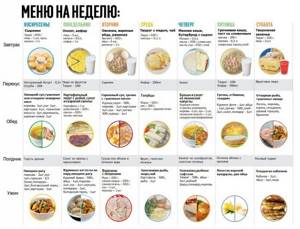
Nutrition for a nursing mother in the first month photo:
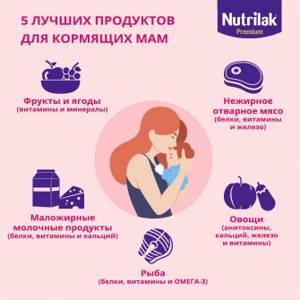
Second month
From the second month, a nursing mother's diet includes more foods. In the second month, new varieties of meat, vegetables and fruits appear on the menu of a nursing mother. You can gradually include sweets and dairy products.
The diet taking into account energy value in the second month of lactation is as follows:
- 200 g of buckwheat in water, bread with butter;
- 150 g low-fat cottage cheese;
- 200 g stewed rabbit, 300 g broccoli soup;
- 50 g marshmallows, 1 pear;
- 150 g baked chicken breast;
- mashed potatoes;
- a glass of low-fat fermented baked milk.
Diet of a nursing mother by month, photo table:
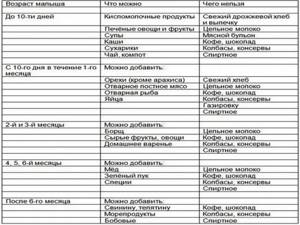
Third month to six months
The diet of a nursing mother for 3 months after childbirth includes the entire list of permitted vegetables, meat, cereals and dairy products. A woman can gradually introduce fish, nuts, and some spices into her diet - oregano, mint, basil.
An approximate menu for a nursing mother for months from the second to the sixth, taking into account energy value, is as follows:
- 2 sandwiches with cheese, a glass of low-fat kefir;
- 50 g marshmallows, 2 peaches;
- 150 g boiled fish, 150 g boiled rice;
- 100 g cottage cheese casserole;
- 200 g macaroni and cheese, 300 g fresh vegetable salad;
- glass of low-fat yogurt
From six months to a year
A nursing mother can gradually include fried foods in her diet. A woman is also allowed to try allergens - eggs, chocolate, honey, red vegetables and fruits. However, do not forget that the diet on breastfeeding and the mother should carefully monitor the child’s reaction to them; if there is a rash or other manifestations, the new product should be immediately discontinued.
The approximate nutrition of a nursing mother by month, taking into account the energy value from the third to the sixth, is as follows:
- 150 g of cottage cheese, 35 grams of walnuts;
- 250 grams of fruit salad;
- 2 eggs, 200 g cucumber and tomato salad, 300 g chicken noodles;
- 30 g dark chocolate, 1 pomegranate;
- 150 g beef chops, 200 g grated carrot and beet salad;
- a glass of low-fat fermented baked milk.
After a year of breastfeeding, the mother can gradually switch to a normal diet. The diet can include all highly allergenic foods, spices and seasonings, exotic fruits, sweets and desserts.
After the end of lactation, a woman is advised to follow the rules of proper nutrition. A balanced diet provides the body with all the necessary minerals and vitamins. Frequent meals and the correct calorie diet do not cause hunger and help maintain a comfortable weight.
Nutrition for a nursing mother by month, photo table:
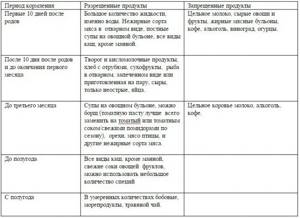
Menu for a nursing mother in the first months, table, recipes, photos:
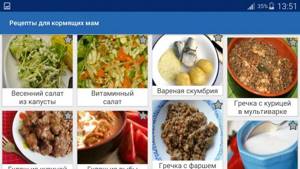

Cheese soup is the best dish for quick weight loss
If you have gained excess weight after giving birth and want to lose it, but you are unable to stick to the diet due to lack of time or willpower, then you just need to add cheese soup to your diet. To prepare it you need one onion, one carrot, a little butter, a pack of processed cheese, parsley, crackers (you can make it yourself by cutting the bread into small pieces and frying it in the oven), salt, pepper.
First you need to put the water to boil over low heat. Onions and carrots should be peeled and washed. Cut the onion into small pieces and grate the carrots on a fine grater. After this, fry the vegetables by frying them in a frying pan with a small amount of butter.
The cheese also needs to be grated. After this, the roast and grated processed cheese should be thrown into boiling water. Wash the parsley and chop it finely. Add to the pan. Cook the soup for about twenty minutes, after which it can be served. Before serving, sprinkle a serving of soup with croutons.
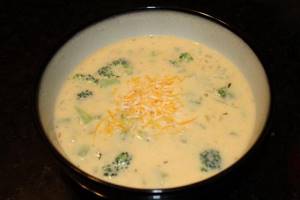
Special food
Nutrition after cesarean section is based on the principles of diet after abdominal surgery. On the first day, a woman should limit herself to clean, non-carbonated water. The next day, mom can eat meat broth, rye crackers, buckwheat with water, and boiled chicken breast. From the fifth day, a nursing woman should follow the usual diet of the lactation period.
Prevention of colic
Food for a nursing mother with a colicky baby should not include foods that cause gas formation. These include grapes, legumes, plums, apricots, figs, and prunes. To treat and prevent constipation in infants, a woman should give up rice, baked goods, and strong tea.
To prevent various diseases in the baby, women can include vitamin-mineral complexes in the diet of a nursing mother in the first month. This procedure is not mandatory, but in the winter-spring period it is difficult for a woman to eat a balanced diet, since at this time there are few fresh vegetables and fruits of good quality, they are more expensive.
Vitamin therapy is mandatory for mothers who have signs of hypovitaminosis: dry skin, apathy, loss of appetite, decreased vision in the dark, insomnia, muscle pain, brittle nails and teeth, bleeding gums. Popular drugs for nursing mothers are “Elevit”, “Complivit Mama”, “AlfaVit Mom’s Health”. Before using vitamin complexes on the menu when breastfeeding for 1 month, especially, you should consult your doctor.
The influence of a nursing mother's diet on colic in a child. Doctor Komarovsky:
Diet when feeding a newborn with mother's breast milk by month, table photo:
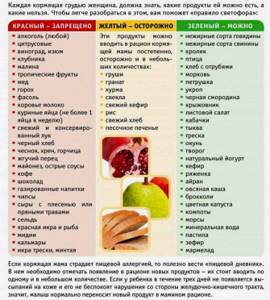
Recommendations for food consumption
In order for nutrition to bring maximum benefit to a nursing mother and her baby, it is important not only to choose the right food products, but also to follow some recommendations for food consumption.
- Portions for a nursing mother should be small, about 300 - 400 grams.
- You need to eat food at least 5 times a day.
- A nursing mother should not feel hungry. If you have a strong desire to eat food and feel hungry, you can have small snacks, even at night.
- Nurses are not recommended to consume sugar, but it is still possible if necessary. It is added to porridge, cottage cheese, tea. You should not overuse sugar, as it can cause constipation and stomach problems in the baby.
Taking medications while breastfeeding
Any medications pass into breast milk, so if possible, a nursing mother should avoid using them. If the drug cannot be stopped, the woman is advised to consult a doctor about the possible effect of the medication on the baby’s body.
When using antibiotics, tranquilizers, narcotic painkillers and other harmful drugs, the mother should stop feeding. During the treatment period, the woman is recommended to express milk to continue lactation. The child must switch to artificial nutrition during the entire course of medication therapy.
If the drug used does not have harmful side effects on the baby's body, the mother may not stop breastfeeding. However, a woman should plan the hours of taking the medicine. The medication should be taken immediately after the baby’s last feeding, and the morning portion of milk should be expressed. If these rules are followed, a minimum amount of the drug will appear in the child’s body.
Is it possible to eat cucumbers, cabbage, and tomatoes while breastfeeding?
Most women are of this opinion: you should give up cucumbers, white cabbage and zucchini, as they are provocateurs of flatulence, and therefore contribute to increased colic in the baby. The explanation is simple: they weaken you because they contain a lot of fiber. Is it really?
- Cucumbers. They are the unreasonably priority vegetables that top the list of foods prohibited during lactation. “Knowledgeable” mothers say that all you have to do is eat a cucumber, and your baby will get green, foamy stools. However, for some reason they forget that such a weakening can happen due to the fact that the child simply does not receive enough fatty hind milk and early fore milk predominates in his diet. In addition, there are a number of studies indicating that digestive disorders in a baby are most often associated with intolerance to the protein contained in formulas and breast milk. Therefore, a nursing mother can eat those vegetables that she was used to consuming before pregnancy. Especially after the first 3 months.
- Cabbage. Why is it necessary to give up such a healthy and tasty vegetable while breastfeeding? If cabbage causes increased gas formation in mother and child, just add cumin to it and the negative effect will disappear on its own. Moreover, sauerkraut is so necessary in winter, because it is a champion in vitamin C content. In addition, white cabbage contains folic acid and a lot of other useful microelements. Therefore, you should discard scientifically unfounded prejudices and include this healthy vegetable in your daily diet.
- Tomatoes. Young mothers refuse them because of the same rich red color, fearing to provoke allergies in the baby. While lycopene, which gives tomatoes their color, is a powerful antioxidant. Both the woman herself and her baby need it. Just one glass of tomato juice can replenish up to half the daily requirement of vitamin C. But you should not drink it on an empty stomach. However, women who are breastfeeding should not consume tomatoes with nitrates. In order not to buy a dangerous vegetable, it is important to know some rules.
You should not buy thick-skinned tomatoes with obvious white veins that are visible on the cut. If you press a vegetable with your finger and a dent remains on it, if you hit it on the floor or wall and it bounces off and does not change shape, then this means only one thing - the tomato is rich not in useful substances, but in chemicals. It is better to avoid using it.
Stimulation of lactation through nutrition
Sometimes a woman does not produce enough milk, and the baby goes hungry. This situation can be solved by stimulating lactation. For these purposes, there are special preparations - “Apilak”, “Laktogon”, “Mlekoin”. However, they can only affect the secondary decrease in milk production as a result of mastitis, rare latching, and use of pacifiers. With a primary decrease in lactation due to hormonal imbalance, these drugs are powerless. Before using medications, consult a doctor.
Increased lactation
In addition to drug treatment, there is an alternative way to increase lactation - eating certain foods and following a diet during breastfeeding in the first month. Carrots, lettuce, radish, and lemon balm can increase milk secretion. They can be eaten raw by a nursing mother in the first month, or made into decoctions and infusions. A popular recipe is a 1 to 1 mixture of carrot juice with 10% cream. This drink stimulates milk production and supplies the mother’s body with a large dose of vitamin A and D.
Nutrition during guardianship by month photo:
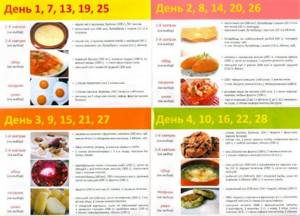
Breastfeeding tips for nursing mothers:
If your baby has colic
The nature of colic is still not fully understood, but increased gas production definitely aggravates the situation. So, with severe colic and flatulence in a baby, you will have to tighten the diet by excluding from the diet:
- fresh and sauerkraut;
- grape;
- legumes;
- fresh bread and any pastries;
- ice cream;
- fresh apples;
- chocolate products.
To begin with, limit the consumption of these foods for a week, and then watch the situation. Let us remind you that you should not drink milk or carbonated water at all for the first months. In addition to the diet for the mother, colic can be treated in other ways.
Can a nursing mother have beer, juice, tea, coffee, kvass, compote?
Drinks are a separate topic that interests many mothers who breastfeed:
- Cocoa and chocolate. It is actually better to refuse to take them. And there are really justified reasons for this. The proteins that make up cocoa beans can cause serious allergies in an infant. In addition, each of these drinks has a high sugar content, and it is better to limit sweets during breastfeeding, if not completely eliminate them.
- Kvass. The ban on this drink is due to the fact that it contains yeast, as it is the result of natural fermentation. They can cause bloating in the intestines of mother and child. If you purchase industrially produced kvass, it will certainly contain concentrates and additives, and it is often carbonated. You can take a few sips if you have an irresistible desire, and if the drink contains nothing but sugar, yeast and malt.
- Beer. It is a mistake to mistake this drink for being harmless, natural and not harmful. You shouldn’t believe commercials – there has been no natural brewing in Russia for a long time. All beer is the result of a combination of harmful components and preservatives. In addition, alcohol is harmful to the baby, and he will definitely get it if a nursing mother drinks beer. Some women are thinking about drinking beer that does not contain alcohol. But this drink, in order to transform, went through many production stages, which means it is far from healthy for both mother and child.
- Juices. You should not think that the juices that are on store shelves have benefits for the health of a woman, or especially a child. All of them are oversaturated with preservatives, made from concentrates with a heavy dose of sugar. Therefore, apart from taste pleasure, such drinks can no longer bring any benefit. If you want to treat yourself to juice during lactation, then you should prepare it yourself and consume it in small dosages. Pomegranate, carrot and apple juice are allowed.
- Compotes. This drink is definitely approved for use by a nursing woman. You need to cook it using dried fruits; if you decide to add berries, then you should watch the child’s reaction.
- Strong brewed coffee and tea. These drinks can harm a child due to the caffeine they contain. It can cause increased irritability, anxiety and sleep disturbances in the baby. This, in turn, negatively affects the baby’s nervous system. Moreover, scientists have repeatedly confirmed this fact in their studies.



